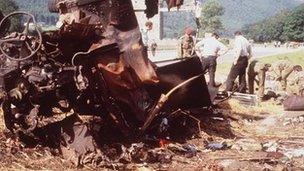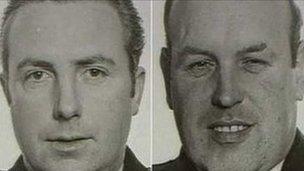Narrow Water bomb evidence 'interfered with', Smithwick Tribunal told
- Published

18 soldiers were killed in the Narrow Water atrocity in 1979
Forensic evidence in a bomb attack which killed 18 soldiers was lost when a detonation site in County Louth was interfered with, a tribunal has heard.
The British Army suffered its greatest single casualty toll in the Troubles at Narrow Water in south Down in an IRA attack in 1979.
A former RUC detective involved in the original investigation gave evidence to the Smithwick Tribunal on Thursday.
The tribunal is investigating the murders of two senior policemen.
There have been allegations of Irish police/IRA collusion in the 1989 murders of Chief Supt Harry Breen and Supt Bob Buchanan in south Armagh.
Flattened ferns
Witness 69 said it was three days into the investigation before forensic officers from Northern Ireland were given access to the County Louth site where the Narrow Water bombs were detonated.
When they arrived on the Thursday evening, they could see cigarette butts, food and an area of flattened ferns where people may have lain, he said.
The forensic investigator was excited and said "with the right team we'll get good forensic evidence".
He said an agreement was made with the Garda officer in charge that the scene would be preserved until the following morning.

Harry Breen and Bob Buchanan were murdered by the IRA in 1989
However, he said the next day when they returned, the site had been badly damaged.
Witness 69 said he could tell the ferns had been cut down and "it looked like wholesale destruction of a whole area to me".
He said the Garda officer in charge of the scene was former Detective Sergeant Owen Corrigan.
Mr Corrigan's legal representative said his client had "no hand, act or part in having cut down or instructed anyone to cut down ferns" and that he was not in charge of the detonation site.
The former detective said he and the forensic officers had been bitterly disappointed by what had happened at the site.
He said this then developed into "great resentment and bewilderment" when he learned that two people who had been arrested while travelling away from the scene of the attack on a motorcycle were released and simply charged with motoring offences.
The legal representative for An Garda Siochana pointed out that forensic evidence had been gathered from the detonation site and sent to headquarters in Dublin.
Smuggling
Some years later when investigating racketeering and smuggling along the border, Witness 69 said Mr Corrigan's name came up again.
He said his information was that he was involved with smuggling.
The witness was told not to have dealings with him or share intelligence with the former Garda.
Mr Corrigan strenuously denies all the allegations against him.
Witness 69 claimed that then and now terrorism, smuggling and criminality along the south Armagh border is controlled by Thomas 'Slab' Murphy.
"Even today no smuggling takes place without his express agreement, people have been killed in recent times because they breached that agreement," he told the tribunal.
He spoke of his disappointment at his feeling that some people who have given evidence "have been circumspect with the truth, and could have provided information more useful to the tribunal".
He said he felt honour-bound to get in contact with the tribunal and to give evidence.
- Published10 February 2012
- Published10 February 2012
- Published7 February 2012
- Published16 December 2011
- Published9 December 2011
- Published29 November 2011